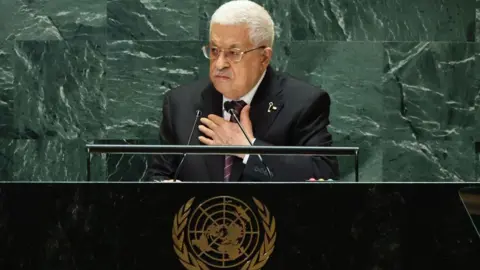The Palestinian President Mahmoud Abbas has been blocked from attending the UN General Assembly session in New York next month, after a visa revocation impacting him and 80 other Palestinian officials, as announced by the US State Department.
US Secretary of State Marco Rubio stated that the officials were undermining peace efforts and pursuing recognition for a Palestinian state. This unusual move was welcomed by Israeli officials, despite the US typically facilitating travel for all nations wishing to engage with the UN.
The ban coincides with international initiatives led by France to formally recognize a Palestinian state at the UN session, a move opposed by the Trump administration.
Abbas, designated to lead the Palestinian delegation, expressed astonishment at the visa denial, asserting it violates international law and the UN Headquarters Agreement, as Palestine holds observer status within the UN.
Israel's Foreign Minister welcomed the US decision, indicating ongoing tensions between the Palestinian Authority and the Israeli government.
This political context is exacerbated by internal governance struggles within the Palestinian territories, with Abbas' authority being challenged by rival factions and issues surrounding Israeli settlements in occupied areas.
Despite the historical recognition of the Palestinian Liberation Organization (PLO) as a legitimate representative of the Palestinian people, current dynamics further complicate the prospects for peace negotiations.
The announcement from the US underscores the complex interplay of international relations, domestic governance issues, and the enduring quest for statehood among Palestinians amidst an atmosphere of conflict.


















